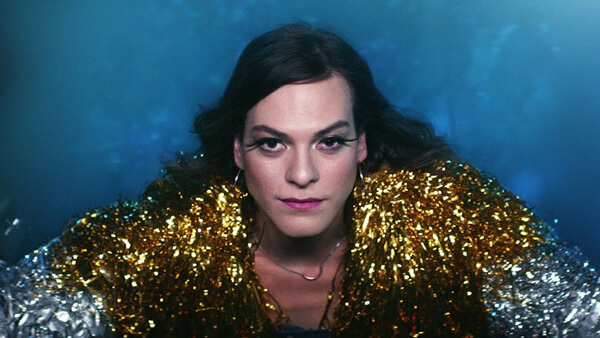“A Fantastic Woman” Review

This is a guest blog from Pearl, a community member and local film buff. Thanks Pearl!
Chile’s contender [now winner!] for best foreign language film Oscar is cognizant of the difficulty in the death of a lover, dealing with the previous family, and the added difficulties of a transgender life.
“A Fantastic Woman” is a fantastic film by director and co-writer Sebastian Lelio (Gloria, 2013). Better than Hollywood, foreign films treat transgender identities in more sensitive, understanding way and “A Fantastic Woman” does just that.
Set in modern day Santiago, the film is a confident love letter to transgender isolation and empowerment. Moments of dry witty comedic relief eases the constant tension onset by police and a family bound by their own essential dogma, inflamed by the fact that the “other woman” is transgender.
Daniela Vega’s lead portrays singer/waitress Marina’s stoicism as stronger than her resolve. Her control of the material and restraint as an actress are remarkable for her big screen debut. Finally, a transgender actor is in a lead transgender role. The dignity of the role shines for who she is, not who she is pretending to be. But so much of Vega’s power on the screen is not in what she says or does. The real power is in her expressive on-camera looks. We witness the look of perseverance in the face of one transgender prejudice after another. The prejudices are disturbingly accurate and will cause any trans viewer to identify with and cringe at times.
Iguazu Falls, in all its power opens the film as the credits rolls. The fall’s force is palpable as cuts of different views takes us down into the plume where a soft foggy mist rises from the tremendous force. Metaphorically, this is where we spend the movie. Floating in a light mist, front and center of tumultuous emotions. The majority of the film’s close camera work style keeps us focused on the story line that goes no further than to advance the difficulties of a transgender life. We are witness to a vast contempt kept within close-cropped scenes.
Once Marina’s 57 year-old lover and partner Orlando (Francisco Reyes) dies during the night of her twenty-something birthday celebration, the safe world the two carved out for themselves is under attack. She now must cope with her grief while asserting her rights and forging a new way forward without him. Threats and insults come from the police investigating his death, and Orlando’s family: Sonia (Aline Küppenheim), the jilted ex-wife, the overly male bravado infused son Bruno (Nicolas Saavedra), and other members. The only family member to show any sympathy for Marina is Orlando’s brother Gabo (Luis Gnecco). He stands up for Marina numerous times in the film. Does Gabo possess a better understanding of the love in his brother’s choice? The world needs more people like Gabo. But there isn’t. So when one is transgender, everything you have to deal with is a little harder.
Let’s start with a simple question: What is your name? To a cisgender person this is a no-brainer. But our heroine is asked this basic question by an officer upon her police-escorted return to the hospital. This is the start of the dissent of the trans dilemma for Marina.
A split second delay in answering the name question, Marina giving her adopted name brings the questioning gaze of the officer on her who now demands to see ID. On the defensive while surrendering her ID, she explains her female status is not completed. (Those with no clue to the transgender world, this might be lost on them.) Now addressing Marina by her birth name, the officer gives a child-like reprimand for her to use her birth name when being questioned. Gabo’s arrival avoids further confrontation and Marina retreats with Orlando’s car back to the apartment they shared. Once in the safety of her home, solace is found with Diabla, Orlandos’s long-time canine companion now gifted to her. This part of Orlando she holds dear is just another opportunity for the family to take something away from her out of their bitterness.
No place is safe from persecution.
Marina’s world becomes invaded by confrontations: Bruno’s unannounced arrival with his father’s keys in hand demanding she leave the apartment, an investigating sexual assault officer arrives at her work demanding she come to the station for more humiliating questioning, and on the phone with a demanding ex-wife Sonia. The only people, other than her singer teacher and restaurant boss who share tender words for Marina is her sister and husband. They go so far as to provide her shelter.
Tender words are not used in confrontations. Trans, and ignorance of what trans is by the characters allows for cheap shots such as “faggot” and “monster” to be used. Or a further discredit to Marina: “Orlando must have been crazy.”
Throughout the film a disconcerting threat of possible violence accompanies the name-calling. Marina at one point as abducted amidst a verbal assault. This is a breath holding moment as some of the family men force her into the back of a truck after her appearance at the wake. There is no explaining away that grief has fueled their actions. When this happens to a trans person, it is a hate crime. In this film the perps get way with it and Marina is released physically in tact after a stressful, humiliating ride in the city. This is a dark reminder of the threat of violence to trans people that goes on.
We all end up in the cemetery.
Since Marina forewarned shows up at the wake, one can expect an appearance at Orlando’s funeral. And with it comes the final tête-à-tête. Marina and the family car come to a stand off on the cemetery road. Marina, standing mid-road as the family from inside the car launches another verbal salvo. We are about to discover Marina’s breaking point. She has had it with these Philistines. Hiking up her skirt, she climbs aboard the car’s hood to the roof. With pain and angst, jumping up and down on the roof, she lets it all out. She now becomes the threat to her abusers trapped inside Orlando’s car, as if it is a coffin itself. Marina lets loose her tirade. In the end, Diabla is all she wants from the family. For the dog’s return she willingly surrenders her keys to the apartment and the life she had with Orlando. As the car drives off, one would believe the family is victor since they had the funeral sans Marina.
Alone in the cemetery, Marina deals with the angst of missing her last chance to say goodbye to Orlando. Previously at times, her deceased lover revealed himself to Marina as a speechless vision. He now directs her to the crematory moments before his incineration. Orlando’s apparition as the tender lover he was stops and kisses Marina as gently and lovingly as we have witnessed before. Then disappears through locked doors. Pounding for entry the crematory workers allow her access and a moment alone. To see Orlando’s body to say good -bye is all she desired. Fuck you to the family, they will never know.
A personal requiem.
The returned dog is fed. The stage is set. Marina primps herself. Standing proud and tall she joins her singing teacher and a small ensemble on a stage. Previously we learned of Marina’s vocal talents when she visited her teacher. Now is time for a grand performance to rise above all the chaos. (Daniela Vega is an opera singer.) She doesn’t disappoint. Closing the film, as a personal requiem comes Handel’s “Ombra mai fu,” “Never was a shade.” As Marina’s performance ends, tears for her lover finally run down her cheeks. We can share her pain and triumph.
Ombra mai fu
Tender and beautiful fronds of my beloved plane tree,
Let Fate smile upon you .
May thunder, lightning, and storms never bother your dear peace,
Nor may you by blowing winds be profaned.
Never was made
A vegetable (a plant) more dear and loving or gentle.
George Frederic Handel, 1738
Posted on March 5, 2018

